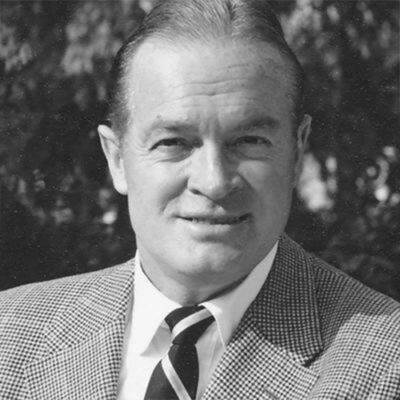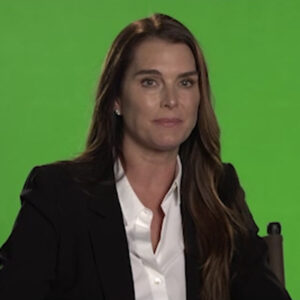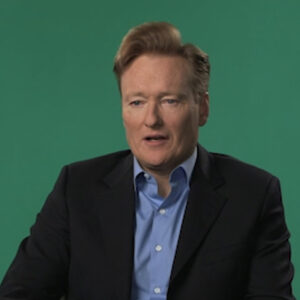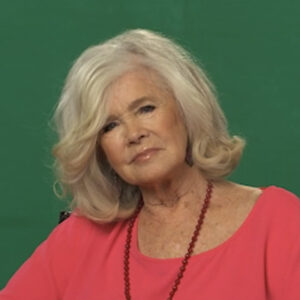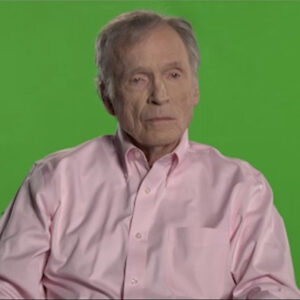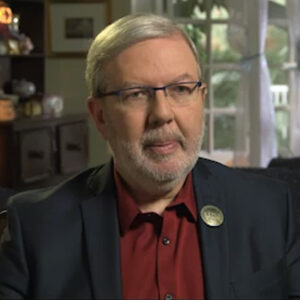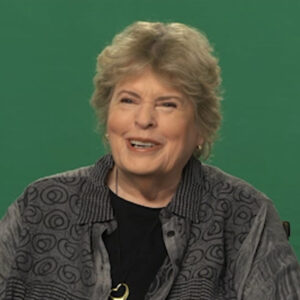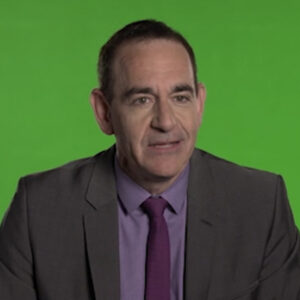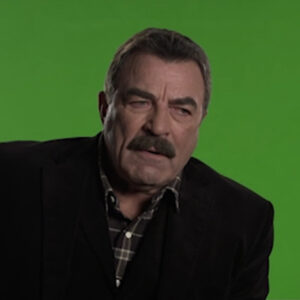Speaker Let’s go back a few years. What does it mean to a young comet to be in the Bob Hope show?
Speaker I think for a young comic to be on the Bob Hope show, it was really amazing.
Speaker Like, first of all, there was this sort of idea that you would arrive like there’s always this sort of thing when you’re a young comedian, like, what have I arrived? What is the action of arriving? And so being selected to be part of Bob Hope’s young comedians special is just very much this kind of arrival, this very solid thing. You know, there was a lot of comedy happening on television at that time, but relatively little on the big networks. You know, at that time, television was completely different. There was really four big channels and there was cable where you would see a lot of comedy, but that wasn’t as big as cable is now. Then it was really about the four networks. And even then three of them really counted. It was ABC, NBC and CBS. And so, you know, to do the Young Comedians special, it was a show that came out every year. It was around Christmas time. It was part of this holiday programming. It was Bob Hope bringing these comedians who he felt deserved a very, very big audience. And that’s what we got. And it was a very big deal. And I was really thrilled to be able to participate.
Speaker What did you do about Bob Hope before you stepped on the stage that day?
Speaker I well, I know about Bob Hope from all of his movies with Bing Crosby and of course, all of this road to kinds of things. And then, of course, that the more time Bob Hope, this guy that would be going out to entertain the troops, wherever they may be, whether that’s Korea all over the world, this incredible, I think. It’s sort of he was part of the military, he was part of the entertainment division about morale and about telling the boys overseas that we were still thinking of them and we were sending over this great entertainer to to show how much we we cared.
Speaker And so Bob Hope’s reach as an entertainer was was vast. It was beyond just kind of being a comedian or or a movie star or a television star. He was some somebody that sort of encompassed politics in a very wholesome way. He certainly wasn’t like Jane Fonda or any of these sort of political celebrities, but he was political, but in a totally mainstream, wholesome, almost sort of not really sort of defined politically, but more of a patriot, a sort of what we might know is like a practical patriot. So I I had a pretty good understanding of who Bob Hope was, and it was thrilling to be a part of that show.
Speaker Did you find him funny?
Speaker I thought it was really funny. He was really up. Kind of always breaking that fourth wall. He always had sort of an eye to the audience like that smirk, that kind of like you. And I know this is a big joke. And that was the joke. That was his I don’t know if that’s his legacy.
Speaker It’s his style. It’s a very modern way of thinking about comedy. It’s not just being a buffoon, although there’s there’s something to that as well. There is quite a lot of physical comedy, too. There is sort of a linking between what we know as modern day stand up comedy and vaudeville. So there’s like this burlesque. He’s he’s sort of a classic baggy pants comedian as well. So there’s a lot of different layers that are happening when you when you think about Bob Hope.
Speaker Did you watch it on TV, did you folks watch him on TV?
Speaker My family watched him on television. We watched him over the years, whether it was young comedian specials, whether it was his appearances on all sorts of different kinds of television, whether it was the movies, I think that’s probably where I saw most of his work, is the reruns of all of the road to whatever, wherever, all over movies with Bing Crosby. That was probably the most familiar, also the caricature where it was this the face of like this line and drawing and then little ski jump nose and in as clear, clear and understanding who this was, but not in a scary way like Alfred Hitchcock. It was kind of like this very kind of adorable, cute little thing where you saw that guy as a friend.
Speaker That’s great. Now you have success across many different platforms. So did Bob. He was in vaudeville, he was Broadway, he was movies, television, radio. He wrote books. How hard is it to have success across all those platforms? What does it tell us about Bob?
Speaker I think it’s really interesting when people are, I guess, like a polymath where you could do a bunch of different things and be equally successful in all of them. I think for Bob Hope, it’s an incredible achievement to go into. You know, you go start in sort of vaudeville and burlesque.
Speaker I know it’s very early, early, early performances were with Josephine Baker. Like this is a different era of showbusiness altogether. And so he’s coming out of that and going into movies and then going into television and then going into a very, very big way of television, then going into war and then going into writing books due to being this very American funnyman, a very American elder statesman, when we haven’t had quite as many elder statesmen. You sort of think about, well, there’s Mark Twain and and then, you know, Will Rogers and then then who is there? That’s that’s Bob Hope, who is next. And so I think it’s amazing. All the things that he was able to accomplish in is very, very long life. It’s it’s really incredible.
Speaker As I mentioned, I was watching the clip this morning of you on his show, you finished your routine and then he came over and shake your hand, if any memory of that and what that meant to you?
Speaker Oh, it was incredible. But we had actually spent all of the comedians, all of us, we had spent a lot of time with Bob that and it was about a week that it took to shoot. So you didn’t actually you did your performance. And that was to sort of live to tape to an audience in Burbank. And that was very stressful. And that part that part of it, it was interesting that this is and this was Bob was so old by the time we were doing the show, he couldn’t hear very well. He couldn’t see very well. He was having trouble kind of like putting it all together.
Speaker Linda was there, his daughter, and she was helping him throughout it. What was so astonishing about it was that they had him do a set and they piece it together in the editing room later because he couldn’t complete an entire joke. He couldn’t complete an entire sentence. I mean, this this was a very, very close to the end of his life. So the fact that he was just there was amazing and doing what he was doing, it was amazing. It just it took a lot of time. And the entire crew were all people who had worked for Bob through the years. So some of them had been there with Bob for 40, maybe 50 years. And so the crew was incredibly old as well. And and so it was almost like this necropolis, like a city of dead people or a city of almost dead people that were working on the show. They did it, which is incredible. And yet to see the finished product, you would think that Bob was completely with it and all there and doing all these jokes and and hitting the timing and everything. But that wasn’t the case. The fact is, is that they you know, these people who are producing this show who made the show had been very used to working with Bob and knew exactly what it took to make him look just as funny and sharp as his former self. And so that was really amazing to see. And, you know, it was a great experience to be able to work with him and Phyllis Diller, who was also around there, who was sharp as a tack, completely like I can’t believe like how how she was able to sort of preserve this mind. That’s what’s incredible to me. But Bob had not fared as well in that department. So it was a fun experience to be around everybody and to see it all kind of play out.
Speaker That’s great. Do you have memories of seeing him host the Oscars at all?
Speaker I don’t have memories of seeing him, the Oscars, I think that is maybe a little bit before my time of actually watching the Oscars that I don’t remember as clearly.
Speaker I mean, maybe that is something that you you may see, like old film clips of him, you know, when it was at the Dorothy Chandler Pavilion and it was almost like this dinner, not the big, big, big show it is now, but it was sort of this academy sort of dinner where it seemed to be more of a industry event and not something that was necessarily open to the public. So that I do, I guess I mean, you you you sort of have this image in your mind of him. He always had that that sort of tail in the white shirt with the color coming out and being very grand and very showbiz, very elegant.
Speaker Watching on the big screen, as you were talking about an hour on the small screen, for that matter. Is there any way you can say you learn something from them by watching him?
Speaker I think when you watch Bob Hope, you learn you learn that when you’re having fun, the audience cannot help but have fun with you, that you can screw up a line, that you can make a mistake, that you can laugh when you’re not supposed to laugh and people will just be with you because you look like you’re having the best time in the world. I think that’s one of the things that was really important to recognize about Bob Hope.
Speaker I think that once we see we as the audience see the performer having a great time, then we have to that that fun, that smile, it’s infectious, is contagious. And we want what you have.
Speaker That’s great of a little bit before the time you worked with him, he was known really in the 50s and the 60s for doing topical monologues before Johnny Carson, before a lot of other people in many ways, as you were saying, like a standup in some ways. How hard is it or what are the challenges of doing topical monologues and getting an audience on your side when you’re making those kinds of observations?
Speaker Well, I think that topical humor is very difficult to do and very important to do, especially now in the way the world is and the way things are changing and the way social media is. And then we’re constantly really refreshing and needing to think about news differently. And so but that wasn’t any different back then either. It was an incredible achievement for somebody to go and talk about the news and talk about it in a very confident way and sort of be out there and doing that. This very new medium of television, you know, it’s very modern.
Speaker And so, you know, we have a lot to thank Bob Hope for. That’s an incredible achievement that that invention of the sort of like that monologue at the top of the show, that’s all him. And that’s so amazing.
Speaker Great, thank you. That’s great. Um, you touched on it before, but let’s get a little more depth. Um, what do you think it meant to America and to the troops that he spent so much?
Speaker Entertaining, I think it was an incredible statement of supporting the troops, you know, supporting the troops when it counted, when it when it counted, when we’re talking about World War Two, when we’re talking about Korea, when we’re talking about Vietnam, you know, that’s a big deal for an entertainer to sort of like not even think about what his value is to the studio, what his value is to television, what his value, all of his sort of contractual obligations to sort of throw all of that away and go into these spaces where we are at war as a nation. That is incredibly ballsy thing to do, as well as something that really speaks to the kind of man that Bob Hope was that this is. This way of showing that we we still we still belong to this country and and no matter how far we go, we’re always going to be Americans. And it it was a theme that he visited many times in his work with all of the road to films with with Bing Crosby. But it was this kind of thing where, you know, he’s sort of later became a very parental figure and and to be out there with these young men risking their lives for our country, it was a very, very big deal. So I think that kind of celebrity, that kind of star only comes once in a great, great millennium. You know, it’s a very it’s it’s a once in a millennium. It’s never it’s never going to happen again. What a magic. What a magic force and what a magic.
Speaker Many people have commented on Bob’s timing, how great his timing was, is a. If you can talk about that, fine, but also talk about how important timing is to a comedian.
Speaker Oh, I think timing is is is really most of it, it’s saying it in the right time frame or the right way. You know, that’s something that Bob Hope was incredibly gifted in and it was something that they could recreate later when he wasn’t so good at that, when he was very, very old. He was able to sort of trademark a kind of timing so that people who were editing could understand this is what Bob Hope sounds like and this is his timing and this is how we do this. And here’s the formula for it and how we can recreate it.
Speaker And it’s a you know, it’s something internal. It’s something that for him, it’s less obvious because when when Bob is telling jokes or talking, there’s a couple of different things happening. There’s an inside joke. There’s there’s sort of like this play with his partner or whoever he’s talking to. There’s whether that’s Bing Crosby or, you know, it’s Jane Russell or whoever, there’s always that sort of comic foil. And then there’s making sort of jokes about Paramount or are making jokes about what’s going on. And then there’s always just like the laughing, the cracking up during it. So the timing is a lot of different elements to it. It’s it’s multifaceted and it’s always just glistening.
Speaker That’s great, that’s great. Um.
Speaker You touched a little bit on what he was like, yeah, the that show you worked with him. And a lot of young people these days, if they know Bob Hope at all, they think of him as the kind of cue card reading. Yeah, I mean, and should he be remembered that way or how else might be written?
Speaker Oh, well, the best way to remember Bob Hope is, is through his incredible legacy in film and television and all the things that he was able to accomplish. And certainly that, you know, when you think about him, when you know, he’s very old and and kind of like only able to sort of remember small things at a time and small sentence at the time. And that’s not an accurate representation of who he is. That’s just a snapshot at the very end of his life. You know that that’s just the eventuality of age. It’s just the the way that we age. And that’s something that happens. But he should be remembered for all of his accomplishments and all of his achievements. And also, you know, that kind of like. Snarky grin, that incredibly pompous buffoon who, you know, somebody who’s. It’s way through life, and that’s such a great kind of an icon to be, and and so I think that there are so much to remember him by.
Speaker So let’s see if you can remember, are there any sort of specific road movies or scenes that in the back of your mind, you remember?
Speaker I think that there’s always they always it’s it’s weird because I’m like, is that a road to movie? Or is that Abbott and Costello? Like, there’s so many like is this the Three Stooges? I know it’s not the Three Stooges because there’s three of them, or actually four, sometimes five. But there’s always those other additional stooges that you’re like, is this a stooge? I’m not sure this is a Shemp. I don’t know where to categorize Shemp. And then I’m like, is it’s like all of these kinds of movies that are like I just remember you always remember, like Bob Hope and Bing Crosby and like turbans or like the Casablanca, like the hats that have the French Foreign Legion or like these kinds of things are just those things.
Speaker There’s always sand around. There’s always a song, it’s always black and white, and it’s always very, very exciting.
Speaker What are the tips for you? What are the differences between performing for a live audience and performing to a camera?
Speaker I think performing to a live audience is really I mean, it’s what I enjoy, it’s what I, I do what I what I feel most comfortable doing with when you’re working in a movie or TV or whatever, when you’re filmed, it’s hard to know exactly what it’s going to look like or how it’s going to hit you. Just do what you can or you try to do an approximation of what you do as a life performer. I think based everything on doing live standup comedy, everything, whether that’s timing or writing or whatever, this kind of thing that you can put into a scene or, you know, whatever, they try to base it on what I do as a comic.
Speaker De.
Speaker We covered, like three questions and yeah, you didn’t really have a lot of answers on those questions.
Speaker Yeah, yeah. Yeah, yeah.
Speaker Oh, do you see anything that Bob Hope is doing in the movies or on television that you see in, uh, today’s generation of comic or Con?
Speaker I think it’s just that stepping outside of like, can you believe it’s just happening to me right now? Like, I was just talking at first of all, talking out of the side of your mouth, this is like a very this is like it goes like that’s like a sort of Bob Hope thing. But, you know, this still happens. It’s like I’m trying to not let you see what I’m saying. But you of course, you got to see what I’m saying. Because what I’m saying, it’s like that this.
Speaker That is everywhere, every comedian and, you know, if you look at the lineage of this, this kind of thing is it’s Johnny Carson, it’s David Letterman, it’s every anybody.
Speaker That Sparboe.

